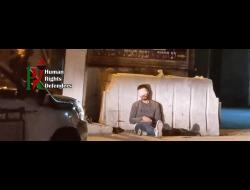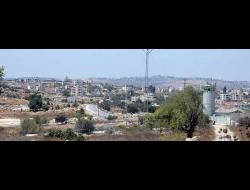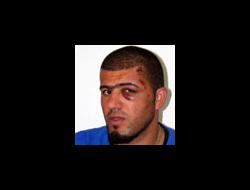Muhammad Jabali, student

Last Sunday [18 March], around 11:00 A.M., I got to the Huwara checkpoint on my way home from a-Najah University . There were about twenty people in line in front of me. At 11:30, seven people were in front of me. I looked at the soldiers, who were standing alongside the line for adults and women. A fence made of iron bars separated that line from the line I was in. There were two soldiers, one of them a black man. The black man looked at me, and our eyes met. He was about 1.7 meters tall and was stout. He shouted at me in Arabic, "Come here, you bastard!" He and the soldier standing next to him came toward me, but they were still on the other side of the fence. I said to him: "What's bothering you?" He replied in Arabic, with an accent, "Why are you swearing at me, calling me a kushi [nigger]?" I replied that I didn't say anything, and that I am not familiar with the word " kushi ." He tried to pull me through the iron bars. I said, "Wait a second, I'll come over to you on my own."
I left the line. The black soldier demanded my ID card, and I gave it to him. He and the other soldier told me to follow them. Suddenly, another soldier ran toward me. I was afraid that he was going to hit or push me, so I moved away. He shouted at me in Arabic. The two soldiers led me to a small room, about 1.5 meters square.
I knew this was the place where soldiers beat young men, a place where nobody could see them. Before I went into the room, the black soldier kicked me in my right thigh. The two soldiers pushed me into the room and then three other soldiers came in. One of the three said, "Stand here," and I stood where he said. I understood that they wanted me to stand in the corner, so that people crossing the checkpoint couldn't see me. Three soldiers left the room.
Of the two soldiers who remained, I can clearly describe one of them. He was 1.7 meters tall, was dark-skinned, had an average build and was about 27-30 years old. He tried to hit me in the head with his metal helmet, but I averted the blow. He slapped me in the face a couple of times. The two of them shouted at me and beat me all over my body with their hands. The dark-skinned soldier told me, in Hebrew and in Arabic, "Why do you say kushi ?" I responded, in English, that I didn't know that word. I then said, "Do you know Hebrew?" He said he did, and I told him that I don't. I asked him to get a soldier who speaks Arabic. He didn't respond. The two soldiers left the room.
Ten minutes later, the two soldiers came back and yelled at me in Hebrew. They cursed my mother and sister. One of them tried to slap me in the face, but I grabbed his hand. He yelled at me, and I said, "Don't hit me." They pushed me. After three minutes passed, they left the room.
Ten minutes later, the black soldier came back and stood facing me. He said, in Arabic, "Why do you say kushi? " Again, I told him I wasn't familiar with the word kushi, and that I didn't understand Hebrew. Three other soldiers were standing next to the door, watching me. Suddenly, the soldier kneed me in the genitals. I felt intense pain. He was about twenty, thirty centimeters from me. He slapped me hard, looked at me, smiled, and left.
Less than a minute later, the three soldiers who were outside came into the room. A fourth soldier joined them. The four of them kicked me, punched me in the face, head, and other places on my body. My genitals hurt so much that I couldn't see which soldier was beating me. They gave me a brutal beating. The black soldier slapped me hard a few times and kicked me in the thigh a few times as well. He called me a bastard. They beat me for about three minutes and then left.
The black soldier who kicked me in the genitals came back a third time, looked at me, and smiled. He asked me to show him the injury, but I didn't show him. A couple of times, he repeated, "To see." He said the word hazak [Hebrew for "hard" or "tough"] a few times. I didn't understand the word, but I felt he was mocking me. Then he left the room.
Fifteen minutes later, I called out to the soldiers in Hebrew, hayal [soldier]. Three soldiers came. I told them my genitals hurt and were swollen. They laughed at me and left. A few minutes after that, my mother called me on my cell phone. Before I could answer, a soldier came into the room, shouted at me, and took the phone. I asked him to call an ambulance, but he ignored me and left the room. A short while later, the pain became unbearable, and I shouted that I wanted an ambulance. The soldier who had hit me in the genitals came to the room. He stood by the door and talked on a cell phone for two minutes.
After he finished talking on the phone, I said, "Look, see what you did to me." I showed him the injury. He said, in Arabic, "Fine." My genitals were very swollen. I said, "It not fine, can't you see?" He smiled and left. I said to him, "Let me go to the hospital," but he didn't care.
Five minutes later, the same soldier came and gave me back my ID card and cell phone. I tried to ask the other soldiers to call an ambulance, but he moved me far away from them. He took me by the hand and led me toward the people who were crossing the checkpoint on their way toward Nablus .
I called my mother, told her what happened, and asked her to go to Refidiya Hospital [in Nablus ]. I got into a taxi and went to the hospital. The doctors examined me and referred me to the specialist hospital in Nablus for treatment.
My sister's husband came to Refidiya Hospital . My mother had told him what happened. He accompanied me to the other hospital. The doctors examined me and took an ultrasound. They found bleeding and a blood clot in the right testicle. They operated, removed part of the testicle, and stopped the bleeding. I was discharged the following day.
The day I was discharged, my father went to the DCO in Huwara and filed a complaint against the soldiers. I want to file a complaint against them. They assaulted me, and I didn't do anything. The soldier who beat me wanted to kill me or paralyze me. The doctor told me, "The soldier who beat you wanted to injure you, but Allah wanted to save you from a big problem."
Muhammad Ri'ad 'Issa Jabali, 18, is a student and a resident of Beita, Nablus District. His estimony was given to Salma a-Deb'i 21 March 2007.


